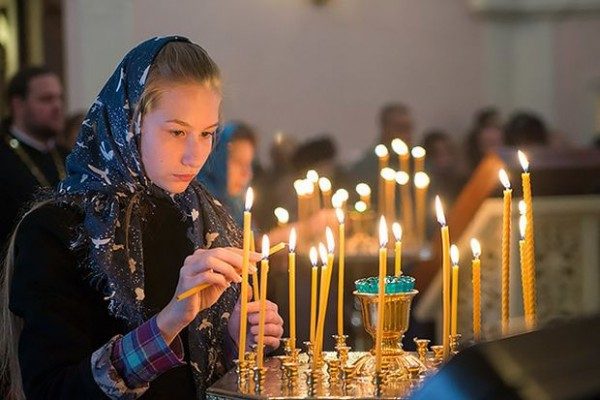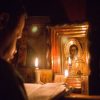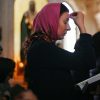The Reading from the Holy Gospel according to St. Mark. (2:1-12)
As I read this passage earlier in the week, I was struck by something interesting. I was amazed by the way that Our Lord Jesus Christ dealt with the paralytic that was brought before Him on a stretcher. What amazed me was that there was no hesitation from the Lord. He gave the paralytic exactly what He needed immediately upon seeing him. But the way that the Lord does this defies all human logic and reasoning. If any one of us looked at the man on the stretcher and was asked to diagnose his biggest problem, there is no doubt that we would all come up with the same answer, “he can’t walk, he is paralyzed.” And that would be correct according to our eyes and his plain physical condition. However Our Lord Jesus Christ has eyes which see much deeper. He is the true physician who sees to the depths of our being. In His opinion, this was not the most important issue that required healing. There was something much more important.
We often approach God with a list of preconceived notions about what we need. We want God to fix the glaring problems in our lives, unruly children, inattentive or controlling spouses, impossible supervisors and co-workers. We also have a preconceived list of our own issues that we want God to help fix. Typically this list begins with physical ailments and physical needs. Sometimes the list includes financial needs. We also struggle with emotional issues. We are often in apathy or anxious, impatient, angry, depressed or even in despair. We even come to the church with the expectation that the Lord will fix all of these things that are at the top of our lists. The 4 men who carried their friend to Jesus Christ also had a preconceived notion about what was needed. They knew how Jesus could help their friend. They had heard of and probably had seen His other miracles, but little did they know that the Lord had much more planned for this paralytic than simply walking.
My brothers and sisters the Lord has much more planned for each of us than simply healing our physical issues. He looks at each of us and He sees our deepest needs. He sees our lives and everything that we have ever done, both the good and the bad. Both the things of which we are proud and the things that bring us shame. He looks at each of us and sees our deepest needs, even the need to have our sins forgiven and to hear these words “Son (or daughter), your sins are forgiven.” Our God is the God of mercy who does not want us to be buried alive in our sins. He does not desire the death of a sinner but rather that they should return to Him and live abundantly. The Lord Jesus Christ sees our fallen nature and the way that sin has paralyzed each of us, but He has compassion on us. He loves us more than we can imagine. “Son your sins are forgiven.” This is among my very favorite verses in all of the gospels. It is a word of joy and promise given not only to this bed-ridden man, but to each and every one of us who is brought to Jesus Christ through our baptism.
In the beginning we are brought by others, someone preached the word to us or we were literally carried by our parents and godparents and brought to Christ at our baptism. But does this process end at our baptism? No! We are called to continue making our way to Christ by all possible means throughout our lives. As Orthodox Christians that is not merely a nice sounding sentiment. It becomes our reality through the life of the Church and her sacraments.
How do we continue to move towards Christ and abide in His presence? Here are some practical steps: Through study of the gospels and obedience to His teachings. That is the first step. Many of the saints tell us that we cannot know God unless we first try to live according to His teachings. How do we hear this word of the Lord “Son, your sins are forgiven” on a regular basis? We hear those words when we come to confession and the priest prays the prayers of absolution, asking the Lord Himself to forgive all the sins that were confessed. And this is the teaching of the Lord Himself as we find in the gospel according to St. John. After the resurrection the Lord breathes on His disciples and says to them “receive the Holy Spirit, whose sins you forgive, they are forgiven, but whose sins you retain, they are retained.”
What is another way that we receive spiritual (and often physical) healing on a regular basis from Christ? Through partaking regularly and frequently of His holy life-giving body and precious blood in communion. This is one of the foundational teachings of the Church.
Listen to the words of St. Cyril of Alexandria who writes
“If the poison of pride is swelling up in you, turn to the Eucharist; and that Bread, Which is your God humbling and disguising Himself, will teach you humility. If the fever of selfish greed rages in you, feed on this Bread; and you will learn generosity. If the cold wind of coveting withers you, hasten to the Bread of Angels; and charity will come to blossom in your heart. If you feel the itch of intemperance, nourish yourself with the Flesh and Blood of Christ, Who practiced heroic self-control during His earthly life; and you will become temperate. If you are lazy and sluggish about spiritual things, strengthen yourself with this heavenly Food; and you will grow fervent. Lastly, if you feel scorched by the fever of impurity, go to the banquet of the Angels; and the spotless Flesh of Christ will make you pure and chaste.”
So we learn that we must not abstain from the bread and the wine which are transformed into the mystical body and blood of the Lord Jesus Christ. An Orthodox Christian receives the body and blood of Christ as often as possible, with no fear of disease, sickness or anything else. They are not mere symbols as some denominations and groups believed. If they were mere symbols they would have no power to help and to aid us in our spiritual struggle. Yet consistently we see the earliest writings of the Church fathers proclaiming the truth of the power of the sacraments. Especially the Eucharist. To receive holy communion is to receive life. To neglect holy communion for long periods of time is to separate oneself from Christ and spiritually to become betrothed to death. However we are called to much more as Christ’s holy ones. We are called not only to regain life but to put on the truelife of Christ and His immortality. As St. Peter says, we are called to become “partakers of the divine nature.”
And who are the four friends in today’s reading? They are those who push us and motivate us to come to the church and to take our relationship with the Lord seriously. Those who preach the gospel to us and encourage us. Those who pray for us and bring our names to Christ when perhaps we don’t have the power or the motivation to pray on our own. Finally, we can also understand the friends who carried the man as symbolic of the clergy, the bishops, priests and deacons of the Church, who administer the sacraments and literally bring the people to Christ, and also bring Christ to the people.
Let us partake of these great blessings that are offered to us and run to Christ for complete and profound healing of both our bodies and our souls. AMEN

















